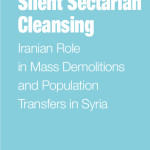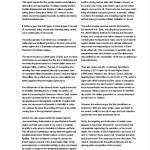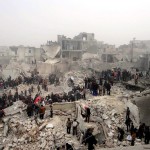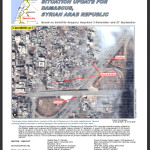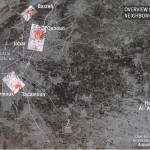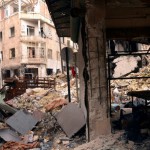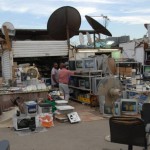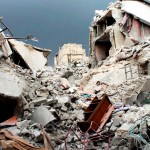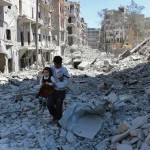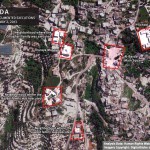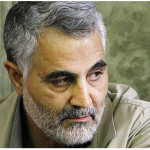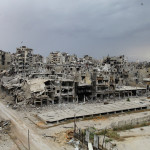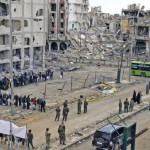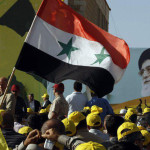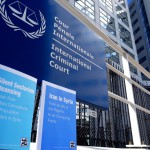SILENT SECTARIAN CLEANSING
The Iranian Role in Mass Demolitions and Population Transfers in Syria
(May 2015)
Chapters & Sections
Foreword
Foreword This report focuses on two specific war crimes and crimes against humanity committed repeatedly in certain parts of Syria since March 2011, namely the unlawful destruction and appropriation of civilian property and the forcible displacement and transfer of civilian population. Together they constitute what appears to […]
Executive Summary
Executive Summary This report argues that the grossly careless and malicious destruction and appropriation of civilian property and the forcible displacement and transfer of civilian population taking place in Syria since March 2011 amount to war crimes and crimes against humanity as defined by international humanitarian law. […]
I. Rumours, Reports, Evidence
I. Rumours, Reports, Evidence There has been a lot of talk about various measures being taken by the Syrian and the Iranian regimes that allegedly indicate a deliberate policy of ethnic or sectarian cleansing in certain parts of Syria.1 But there has been little systematic effort to […]
1. Destruction
1. Destruction The scale of destruction in Syria is quite well documented. It is estimated that over half of the country’s housing units have been completely or partially destroyed since March 2011. In April 2013, the UN Economic and Social Council for Western Asia (ESCWA) reported that […]
2. Demolitions
2. Demolitions One of the few attempts to contextualise satellite images and maps of destruction in Syria was a 2014 report by Human Rights Watch (HRW) titled “Razed to the Ground: Syria’s Unlawful Neighborhood Demolitions in 2012-2013.”1 The report documents seven cases of large-scale demolitions of thousands […]
3. 'Urban planning'
3. ‘Urban planning’ In September 2012, Syrian president Bashar al-Assad issued a presidential decree authorising the creation of two urban planning zones within the governorate of Damascus as part of a “general plan for the city of Damascus to develop the areas of unauthorised residential housing [slums].”1 […]
4. Appropriation
4. Appropriation Mass destruction and demolitions were often preceded, followed or accompanied by three other, related processes: pillage, purchase and appropriation of civilian property in those areas. Pillage There have been countless reports, witness statements, pictures and videos of one particular type of ‘routine crimes’ committed by […]
5. The reconstruction business
5. The reconstruction business In June 2014, the World Bank estimated the cost of reconstructing Syria at about 200 billion USD, while the Economic and Social Commission of Western Asia (ESCWA) put the figure at 140 billion.1 But while this is often presented as a ‘business opportunity’, […]
6. Forced displacement and population transfer
6. Forced displacement and population transfer There are two aspects to the demographic change taking place in Syria: the forced displacement of millions of Syrian civilians, the majority of whom happen to be Sunnis, and the importation and settlement of foreign nationals of Shia origin. It is […]
7. Secretarian cleansing?
7. Sectarian cleansing? Although it is being thrown about too casually in the Syrian context, the term ‘ethnic cleansing’ or ‘sectarian cleansing’ has a strict legal definition. It usually refers to “a purposeful policy designed by one ethnic or religious group to remove by violent and terror-inspiring […]
II. Legal Framework
II. Legal Framework The unlawful destruction and appropriation of civilian property and the forcible displacement and transfer of civilian population are considered serious war crimes and/or crimes against humanity under international law. This chapter outlines the legal framework of investigating these two types of crime in the […]
1. Destruction and appropriation of property
1. Destruction and appropriation of property Since the concept of war crimes was introduced by Article 228 of the Peace Treaty of Versailles, and developed later by the charters of the international military tribunals at Nuremberg and Tokyo, international humanitarian law prohibits the war crime of excessive […]
2. Deportation and population transfer
2. Deportation and population transfer Since the Nuremberg trials, various international tribunals have dealt with the crime against humanity of forcible deportation of civilian population. For instance, in the 1995 case of Nikolić, the International Criminal Tribunal for former Yugoslavia (ICTY) ruled that deportation could be qualified […]
3. Individual and superior responsibility
3. Individual and superior responsibility Individual responsibility One of the fundamental principles of criminal law is the individual responsibility for crimes, meaning no person should be punished for an offence that he or she has not personally committed.1 According to its Statute, the ICC has jurisdiction over […]
4. International and non-international conflicts
4. International and non-international conflicts International humanitarian law distinguishes between international and non-international armed conflicts. International armed conflicts are defined by Article 2 common to the Geneva Conventions as follows: all cases of declared war or of any other armed conflict which may arise between two or […]
5. Legal avenues
5. Legal avenues The ICC Culminating the ad hoc international criminal tribunals at Nuremberg, Yugoslavia and Rwanda, the Rome Statute of 1998 established the International Criminal Court (ICC) to deal with “the most serious crimes of concern to the international community as a whole” (Article 5). These […]
This report was produced by the Research and Advocacy Team of the campaign group Naame Shaam.
© Naame Shaam. Published 18 May 2015
Naame Shaam is a group of Iranian, Syrian and Lebanese activists and citizen journalists that focuses on uncovering the role of the Iranian regime in Syria. For more information, see the group’s website: www.naameshaam.org.
Naame Shaam is supported by the Netherlands-based Rule of Law Foundation, www.lawrules.org.
 English
English  فارسی
فارسی  العربية
العربية 